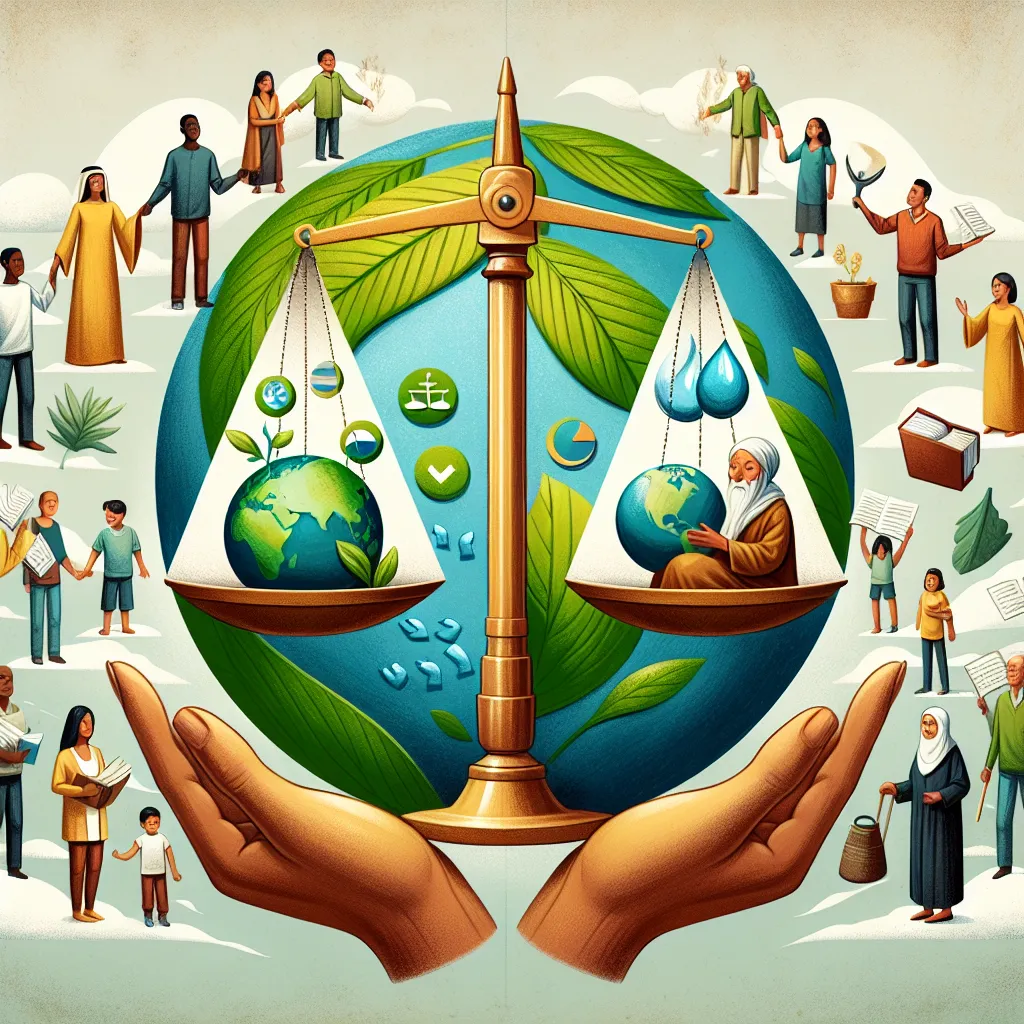Environmental justice has become an increasingly important topic in recent years, making it a popular subject for IELTS Writing Task 2 questions. As an IELTS instructor, I’ve noticed a growing trend of questions related to environmental fairness and equality. Based on my analysis of past exams and current global issues, I predict that this theme will continue to appear frequently in future tests. Let’s explore a relevant question and provide a high-scoring sample essay to help you prepare for this topic.

Analyzing the Question
Let’s examine a typical IELTS Writing Task 2 question on environmental justice:
Some people believe that environmental problems are too big for individuals to solve, and only governments and large companies can make a difference. To what extent do you agree or disagree with this opinion?
This question asks you to discuss the role of individuals versus governments and large corporations in addressing environmental issues. It’s crucial to:
- Clearly state your position
- Provide balanced arguments
- Support your points with examples
- Consider both individual and institutional responsibilities
Band 8-9 Essay Sample
Here’s a high-scoring sample essay addressing this question:
Environmental challenges are undoubtedly among the most pressing issues of our time, and there is ongoing debate about who bears the primary responsibility for solving them. While some argue that these problems are too vast for individuals to tackle, I firmly believe that both individual actions and institutional efforts are crucial in promoting environmental justice and sustainability.
Admittedly, governments and large corporations wield significant power and resources that can make a substantial impact on environmental issues. For instance, governments can implement and enforce regulations on industrial emissions, waste management, and conservation of natural resources. Similarly, multinational corporations have the financial means and technological capabilities to invest in eco-friendly innovations and sustainable practices on a large scale. The Paris Agreement, signed by numerous countries, exemplifies how governmental collaboration can address global environmental concerns.
However, it would be a grave mistake to underestimate the collective power of individual actions. Every person’s daily choices, from reducing plastic use to opting for public transportation, contribute to the overall environmental impact. Moreover, individuals can drive change through their consumer behaviors, putting pressure on companies to adopt more sustainable practices. The rise of the zero-waste movement and the increasing demand for eco-friendly products demonstrate how individual choices can shape market trends and corporate policies.
Furthermore, grassroots movements and community initiatives often start with passionate individuals who inspire others to take action. Consider the global impact of Greta Thunberg’s climate strikes, which began as a solitary protest but grew into a worldwide movement. Such examples illustrate how individual actions can catalyze broader societal changes and influence governmental policies.
In conclusion, while the scale of environmental problems is indeed massive, the solution lies in a collaborative effort between individuals, governments, and corporations. Each plays a vital role: governments provide the regulatory framework, companies have the resources for large-scale innovations, and individuals drive change through their daily choices and collective actions. Only by recognizing and embracing the importance of each player can we hope to achieve true environmental justice and sustainability for our planet.
(Word count: 309)
Key Writing Tips for This Topic
- Balanced argument: Acknowledge both sides of the debate while clearly stating your position.
- Specific examples: Use concrete examples to support your points, such as the Paris Agreement or Greta Thunberg’s movement.
- Varied sentence structure: Mix complex and simple sentences to maintain reader engagement.
- Cohesive devices: Use linking words like “however,” “moreover,” and “furthermore” to ensure smooth transitions between ideas.
- Vocabulary precision: Employ topic-specific vocabulary accurately, such as “sustainability,” “emissions,” and “grassroots movements.”
Essential Vocabulary for Environmental Justice Essays
- Environmental justice (noun) /ɪnˌvaɪrənˈmentl ˈdʒʌstɪs/ – fair treatment and involvement of all people in environmental decision-making
- Sustainability (noun) /səˌsteɪnəˈbɪləti/ – the ability to maintain or support a process continuously over time
- Emissions (noun) /ɪˈmɪʃnz/ – the production and discharge of something, especially gas or radiation
- Grassroots movement (noun) /ˈɡrɑːsruːts ˈmuːvmənt/ – a movement that starts at a local level with ordinary people
- Eco-friendly (adjective) /ˈiːkəʊ ˈfrendli/ – not harmful to the environment
- Conservation (noun) /ˌkɒnsəˈveɪʃn/ – prevention of wasteful use of a resource
- Catalyst (noun) /ˈkætəlɪst/ – a person or thing that precipitates an event or change
- Regulatory framework (noun) /ˈreɡjələtəri ˈfreɪmwɜːk/ – a system of regulations and the means to enforce them
- Zero-waste (adjective) /ˈzɪərəʊ weɪst/ – aiming to eliminate the production of waste
- Multinational corporation (noun) /ˌmʌltiˈnæʃnəl kɔːˈpɔːreɪʃn/ – a company operating in several countries
Conclusion
Environmental justice is a complex and multifaceted topic that requires a nuanced understanding. As you prepare for your IELTS Writing Task 2, remember to consider various perspectives and use specific examples to support your arguments. Practice writing essays on related topics such as climate change policies, corporate environmental responsibility, or the impact of individual actions on global sustainability.
To further enhance your writing skills, I encourage you to write your own essay based on the question provided in this article. Share your essay in the comments section below for feedback and discussion. This active practice will help you refine your ideas and improve your ability to articulate complex environmental concepts effectively.
For more insights on related topics, you might find these articles helpful:
- What Are the Challenges of Achieving Climate Justice?
- The Role of Education in Fostering Social Responsibility
Remember, mastering IELTS Writing Task 2 is about more than just language skills – it’s about developing a well-informed perspective on global issues like environmental justice. Keep practicing, stay informed, and you’ll be well-prepared to tackle any question that comes your way on test day.